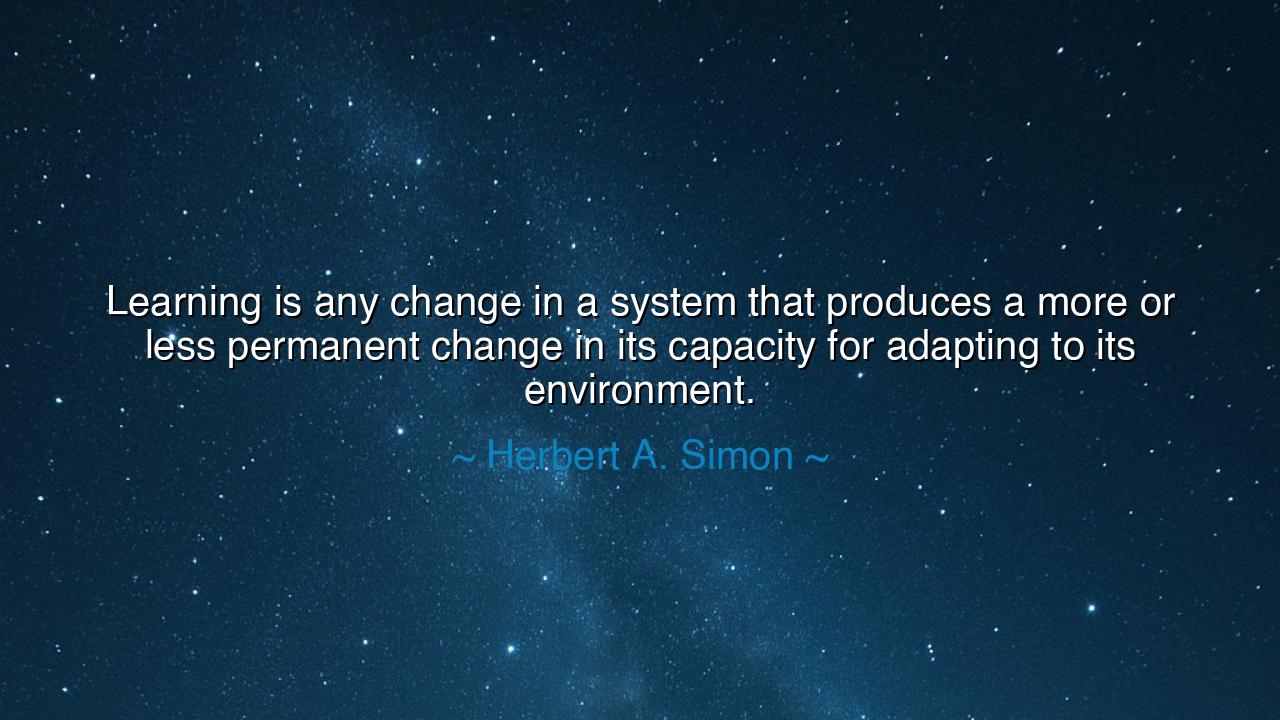
Learning is any change in a system that produces a more or less
Learning is any change in a system that produces a more or less permanent change in its capacity for adapting to its environment.






“Learning is any change in a system that produces a more or less permanent change in its capacity for adapting to its environment.” – Herbert A. Simon
In these profound and scientific words, Herbert A. Simon, the Nobel laureate, philosopher, and pioneer of artificial intelligence, speaks with the voice of a modern sage. Beneath the coolness of his definition lies a timeless truth: that learning is not a mere accumulation of knowledge, but a transformation of the self — an enduring change in our ability to live, grow, and adapt within the shifting world. To Simon, learning is life’s most essential process, the force by which both humans and systems evolve. It is not the memorization of facts, but the expansion of capacity — the awakening of new ways of perceiving, solving, and becoming.
The origin of this idea comes from Simon’s work in understanding how human thought and artificial intelligence intertwine. As a scientist of both mind and machine, he saw that all intelligent systems — whether human brains, organizations, or computers — must learn in order to survive. The living mind and the mechanical system alike must adapt to their environment, growing wiser with each experience. Thus, Simon defined learning not as a static achievement, but as a dynamic process — one that deepens resilience, flexibility, and insight. To learn is to evolve; to fail to learn is to perish. In his eyes, the difference between stagnation and survival, between ignorance and mastery, lies in the ability to change.
Yet, though his language was born of science, Simon’s wisdom carries the resonance of ancient philosophy. The Stoics of Greece and Rome, too, believed that life’s highest virtue lay in adapting to nature. “The wise man,” they said, “does not resist the wind of fortune, but adjusts his sails to meet it.” So too did Simon, in his modern way, remind us that intelligence — whether human or artificial — is the art of adaptation. It is not what we know that matters, but how we respond to change. A system that learns becomes stronger; a heart that learns becomes wise.
Consider the story of Charles Darwin, whose journey aboard the HMS Beagle transformed not only his understanding of life but the world’s. Darwin observed that creatures do not survive because they are the strongest or the swiftest, but because they are the most adaptable. Through that observation, he gave voice to the same truth Simon later captured in his definition: that learning and adaptation are one and the same. The bird that changes its song, the tree that bends to the storm, the human who adjusts his mind to new realities — these are the true masters of existence. Learning, in all its forms, is the quiet revolution that allows life to endure.
To speak of change in a system is to speak of the courage to transform. Every person is a system — a network of thoughts, habits, and beliefs. To learn, therefore, is to alter the architecture of one’s being, to rewire the circuits of perception so that the soul may rise to meet new challenges. But such change is not always comfortable. True learning demands the death of old certainties. It asks us to shed the skin of complacency, to endure the friction of growth. Like the blacksmith tempering iron, life tests us through heat and pressure, reshaping our capacities until we become capable of withstanding the world.
Simon’s insight also reminds us that learning is not fleeting; it must be “a more or less permanent change.” Knowledge that does not alter how we act, think, or adapt is not true learning — it is an echo, a shadow. The student who memorizes without reflection, the worker who repeats without innovation, the leader who listens without changing — all remain static systems in a dynamic world. The wise learner, however, absorbs knowledge into action, turning insight into adaptation. It is this permanence — this lasting shift in behavior — that marks the difference between information and transformation.
So, my children of thought, take this lesson as a torch for your journey: to learn is to become. Seek not merely to collect facts, but to let knowledge reshape the way you move through the world. Be as the river, forever flowing, adjusting its path to the land, yet always moving toward the sea. When change comes — and it always will — do not resist it; learn from it. Let every challenge expand your capacity to act, to think, to endure.
For as Herbert A. Simon teaches us, learning is not a moment but a motion, not a lesson but a transformation. It is the divine process by which the universe, through you, grows more capable of understanding itself. And when you live as a learner — adapting, evolving, and building permanence through change — you do more than survive: you participate in the very rhythm of creation itself.






AAdministratorAdministrator
Welcome, honored guests. Please leave a comment, we will respond soon